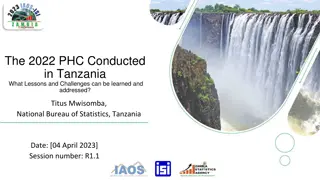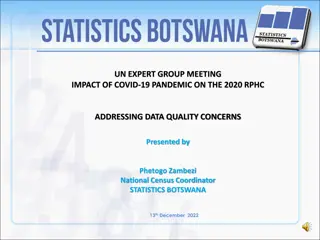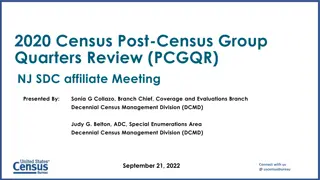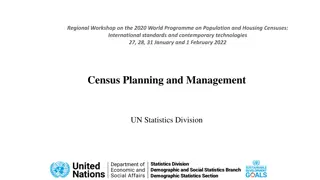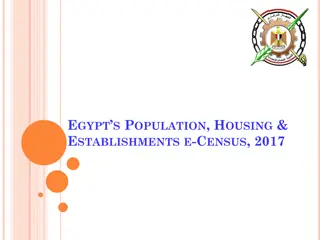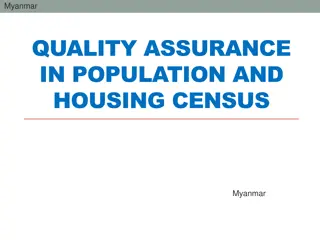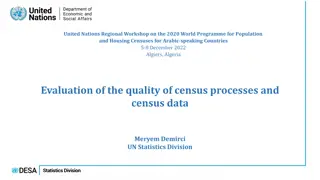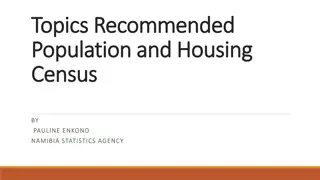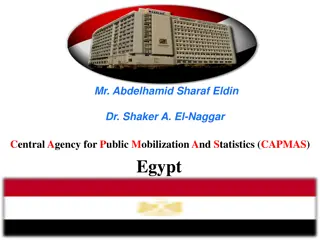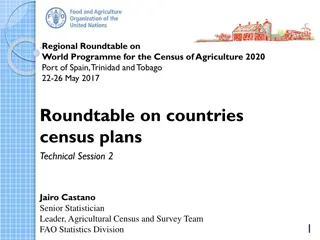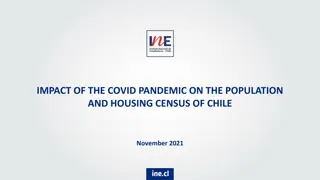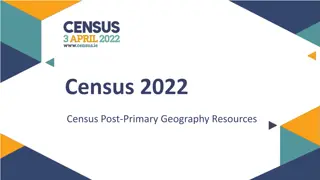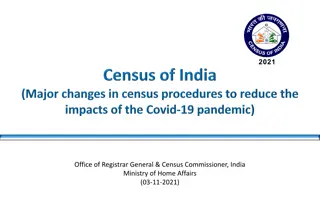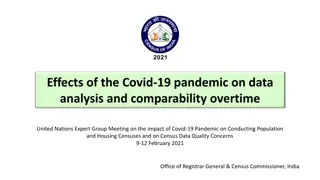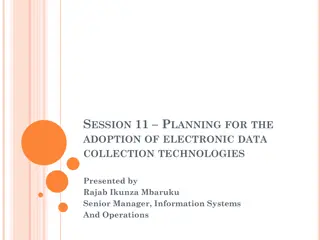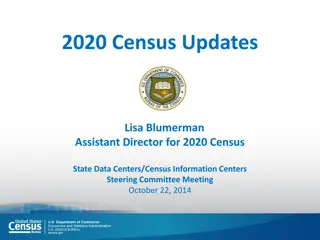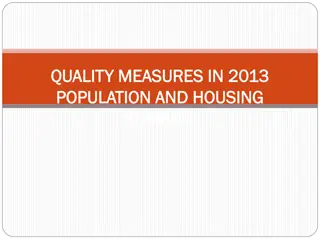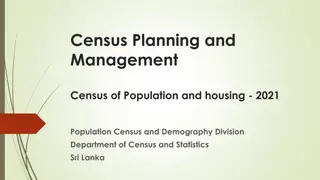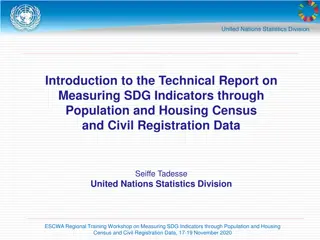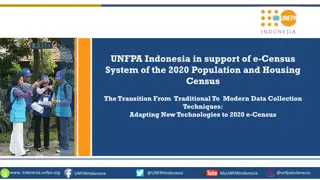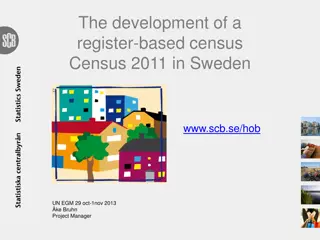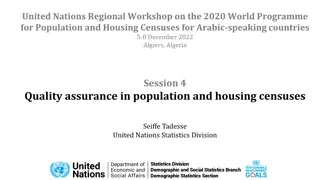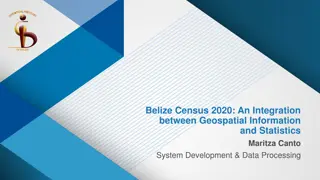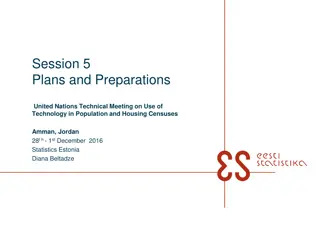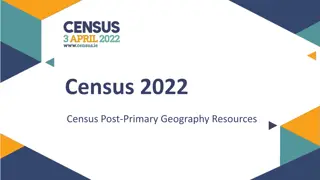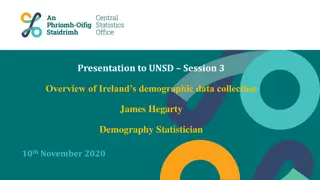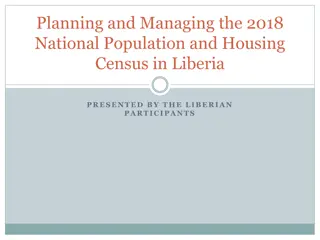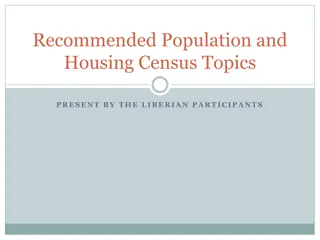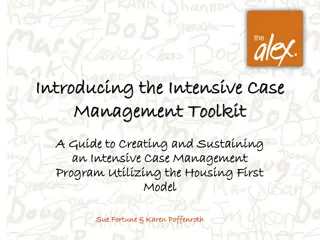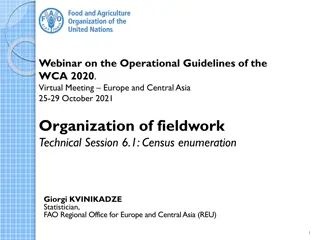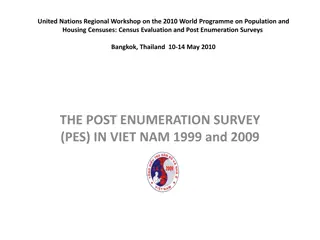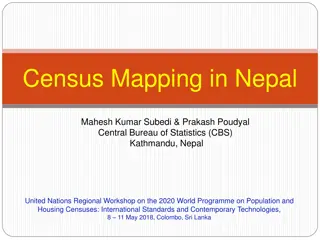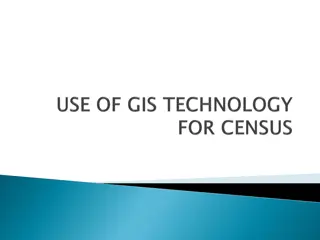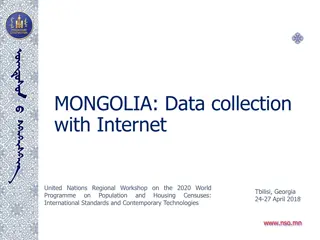Insights from the 2022 Population and Housing Census in Tanzania
Tanzania conducted its 6th post-independence census in 2022, incorporating a parallel Housing Census for the first time. Lessons learned include data collection improvements and addressing challenges such as data demand gaps. The census covered diverse topics like demographics, disabilities, migrati
1 views • 18 slides
Impact of COVID-19 Pandemic on Botswana's 2022 Population and Housing Census: Addressing Data Quality Concerns
Explore the challenges faced by Botswana's National Census Coordinator in conducting the 2022 Population and Housing Census amid the COVID-19 pandemic. Issues such as changes in census dates, review of instruments, cartographic exercises, procurement, training, enumeration, and data processing were
1 views • 20 slides
Sustainable Urbanization and Housing Programme Overview
The Sustainable Urbanization and Housing Programme, part of the NDP III framework, focuses on addressing urbanization and housing challenges in Uganda. Led by the Ministry of Lands, Housing and Urban Development, the programme aims to reduce urban unemployment, housing deficit, improve infrastructur
0 views • 45 slides
Overview of 2020 Census Post-Census Group Quarters Review
The 2020 Post-Census Group Quarters Review (PCGQR) is a program developed by the Census Bureau to address discrepancies in group quarters population counts from the 2020 Census. This initiative allows governmental units in the US and Puerto Rico to request a review of their group quarters' populatio
0 views • 12 slides
Effective Census Planning for Successful Population and Housing Censuses
Census planning is crucial for the success of population and housing censuses, involving phases like questionnaire design, mapping, testing, enumeration, and data analysis. The link between these phases plays a vital role in the overall success of the census operation. The aim of census planning is
0 views • 24 slides
Overview of Egypt's 2017 Population, Housing & Establishments E-Census
The Egypt 2017 E-Census aimed for full population coverage, data quality, stakeholder involvement, confidentiality, cost-effectiveness, and integration with other databases. It focused on place of enumeration, data collection methodologies, and e-census concepts/components for timely and accurate da
0 views • 19 slides
Myanmar Population and Housing Census Quality Assurance
Myanmar conducts a census every 10 years to gather accurate and reliable data for decision-making. The process includes planning, management, field operations, data processing, analysis, and dissemination. Various activities such as consultation, training, and monitoring are carried out to ensure th
0 views • 24 slides
Importance of Census Evaluation in Ensuring Data Quality
A population and housing census involves various complex steps where errors can occur. Evaluating the census is crucial to assess the effectiveness of operations and systems, identify strengths and weaknesses, and improve data quality for future censuses. By establishing a comprehensive evaluation p
0 views • 28 slides
Housing Authority of Savannah: Providing Affordable Housing Programs
The Housing Authority of Savannah (HAS) was established in 1938 to address the housing needs of the low-income population in Savannah, Georgia. Through a diverse portfolio of affordable housing programs, HAS offers a range of housing assistance, including public housing, rental assistance demonstrat
0 views • 15 slides
CCBC Accessible Housing Service Overview
CCBC Accessible Housing Service in Caerphilly County Borough provides unified housing services catering to various tenures. Challenges include deprivation and topography. The service deals with housing options, strategy, and allocations, focusing on Welsh Housing Quality Standards. Private Sector Ho
0 views • 36 slides
Understanding the Housing Improvement Program (HIP)
The Housing Improvement Program (HIP) is a grant program aimed at providing home repair, renovation, and replacement assistance to Native American and Alaska Native individuals facing housing challenges. HIP targets the neediest individuals to eliminate substandard housing and homelessness in Indian
0 views • 8 slides
Population and Housing Census Topics to Cover in Namibia
The Namibia Statistics Agency is preparing for the 2020 census with a focus on gathering data on population distribution, demographic characteristics, migration patterns, education levels, and labor force details. The selection of topics is driven by the country's data needs, ensuring comprehensive
0 views • 13 slides
Egypt 2017 Census: Strategic Objectives and Goals
The Egypt 2017 Population, Housing, and Establishment Census focused on strategic objectives such as full population coverage, confidentiality of data, and adherence to quality standards. The goals included involving stakeholders, achieving compliance within budget and timetable, and ensuring a well
0 views • 54 slides
Housing Best Practices Forum: Enhancing Housing Options and Resource Collaboration
Explore the key agenda items, logistical details, forum format, goals, and best practices review from a recent Housing Best Practices Forum. The forum aims to amplify housing choices, improve resource utilization, foster collaboration among stakeholders for innovative housing solutions, share succes
0 views • 44 slides
Regional Roundtable on World Programme for the Census of Agriculture 2020
The Regional Roundtable held in Port of Spain, Trinidad and Tobago in May 2017 focused on countries' census plans for the World Programme for the Census of Agriculture. The event discussed participation statistics, census rounds, and the status of FAO Caribbean countries in conducting agricultural c
0 views • 13 slides
Impact of COVID Pandemic on Chile's Population and Housing Census
The COVID-19 pandemic significantly affected the Population and Housing Census of Chile in 2021, leading to reprogramming of activities, changes in methodology, and challenges due to budget cuts and teleworking. The census, initially planned for 2022, faced delays and adaptations in response to the
0 views • 7 slides
Importance of Census Information for Local Planning and Decision Making
Understanding the types of information collected through the census and how it can be utilized by organizations to make informed decisions for the local area. Explore the potential impacts of lacking census data on transportation, housing, cultural events, and healthcare services over the next few y
0 views • 6 slides
Census Activities and Methodologies in India
The Office of Registrar General & Census Commissioner in India provides an overview of the Census activities, timelines, and methodologies employed for data collection, management, and dissemination. The process includes phases for houselisting, population enumeration, and updating of jurisdictional
0 views • 18 slides
Impact of Covid-19 on Census Data Analysis: Insights from the UN Expert Group Meeting
The Covid-19 pandemic has significantly affected data analysis and comparability over time, particularly in the context of population and housing censuses. This impact was discussed at the United Nations Expert Group Meeting in February 2021, focusing on the challenges faced in conducting these cens
0 views • 16 slides
Modernizing Census Operations with Electronic Data Collection Technologies
Recent technological advancements have revolutionized census processes, enhancing the efficiency and accuracy of data collection. This session delves into the strategic considerations for adopting electronic devices and mobile data capture in census operations. Insights from past experiences in Keny
0 views • 18 slides
Efforts to Optimize the 2020 Census Operations
The 2020 Census is focusing on operational research and development to enhance self-response rates, reengineer address canvassing, and utilize administrative records. By maximizing self-response through various channels such as internet options and social media advertising, the Census aims to reduce
0 views • 20 slides
Population and Housing Census Process in The Gambia
In The Gambia, the Population and Housing Census is conducted in April during the dry season for accessibility. A detailed mapping process was undertaken using modern technology to prepare for the census. Census instruments were carefully designed, and a pilot census in 2012 helped refine the proces
0 views • 10 slides
Overview of Census Planning and Management in Sri Lanka
The Census of Population and Housing in Sri Lanka has a rich history dating back to 1871, making it the first Population Census in South Asia. The census is conducted every 10 years, except in the 90s, to provide valuable demographic data. Various gazette notifications, including the Census Ordinanc
0 views • 12 slides
Measuring SDG Indicators through Population and Housing Census
The technical report explores the significance of Population and Housing Census (PHC) and Civil Registration and Vital Statistics (CRVS) data in monitoring Sustainable Development Goals (SDGs). It discusses challenges, objectives, and criteria for selecting SDG indicators, emphasizing the integratio
0 views • 20 slides
Transitioning to Modern Data Collection Techniques in the 2020 Population and Housing Census
UNFPA Indonesia is supporting the transition to a modern e-Census system for the 2020 Population and Housing Census. This shift involves adapting new technologies, such as e-Census, to replace traditional data collection methods. The challenges faced include a need for quality field officers, time c
0 views • 10 slides
Evolution of Register-Based Census in Sweden
The development of a register-based census in Sweden, initiated with Census 2011, has transitioned from a mix of registers and questionnaires to a fully register-based system. Motivations include cost reduction and efficient data collection for yearly statistics on households, housing, and dwellings
0 views • 10 slides
Importance of Quality Assurance Programmes in Population Censuses
Quality assurance programmes play a crucial role in ensuring the accuracy and reliability of census data. These programmes help in identifying and rectifying errors at various stages of the census process, ultimately leading to high-quality outcomes that are valuable for data users. Emphasizing on t
0 views • 26 slides
Evolution of Census Mapping in Belize
Integration of geospatial information and statistics in the Belize Census of 2020 marked a significant advancement from the methodology used in the 2010 census. The Statistical Institute of Belize (SIB) plays a crucial role in collecting, compiling, analyzing, and disseminating census data. Census m
0 views • 18 slides
United Nations Technical Meeting on Use of Technology in Population and Housing Censuses
Session 5 Plans and Preparations for the United Nations Technical Meeting on Use of Technology in Population and Housing Censuses held in Amman, Jordan from 28th November to 1st December 2016. The session covered topics such as timetable of Population and Housing Census 2011, training programs for s
0 views • 58 slides
Pathways to Affordable Housing in Birmingham
Pathways to Removing Obstacles to Housing (PRO Housing) initiative, sponsored by the U.S. Department of Housing and Urban Development, aims to address barriers to affordable housing in Birmingham. The city faces challenges of housing scarcity and deteriorating properties, especially in vulnerable co
0 views • 12 slides
Understanding the Importance of Census Data in Society
Delve into the significance of census data through a series of engaging images and prompts. Learn how census information impacts decision-making in areas such as healthcare, education, transportation, and more. Explore the history of census-taking in Ireland and reflect on how census data can influe
0 views • 12 slides
Overview of Ireland's Demographic Data Collection
Ireland conducts a Census of Population every 5 years, with the most recent in 2016. Inter-Census Population Estimates are obtained annually using demographic methods. For the 2020 European Census cycle, Ireland is holding a traditional Census in 2022 due to COVID-19 impacts. A pilot administrative
0 views • 8 slides
Planning and Managing the 2018 National Population and Housing Census in Liberia
Liberia conducted its 2018 Population and Housing Census to provide relevant data for development planning, policy formulation, and service delivery. The census, mandated by Article 39 of the Constitution, aimed to improve citizens' quality of life and support development programs. The project invol
0 views • 14 slides
Overview of Recommended Population and Housing Census Topics in Liberia
The Liberian participants have presented recommended topics for the population and housing census, outlining the history of census-taking in Liberia and detailing the specific topics covered in the 2008 National Population and Housing Census. The census topics include identification particulars, pop
0 views • 11 slides
Intensive Case Management Toolkit for Housing First Programs
Explore the Intensive Case Management Toolkit designed to establish and maintain effective Housing First programs. Learn about the paradigm shift in managing homelessness, the cost benefits of housing vs. homelessness, system use reduction with Housing First, and the principles of Housing First emph
0 views • 8 slides
Operational Guidelines for WCA 2020 Census Enumeration Webinar
This webinar focuses on the operational guidelines for the WCA 2020 Census Enumeration, covering key steps such as pre-test surveys, pilot census, listing operation, and organization of census enumeration. It emphasizes the importance of careful planning to enhance the effectiveness of the census pr
0 views • 21 slides
Post Enumeration Survey (PES) in Viet Nam 1999: Evaluation of Census Coverage
The Post Enumeration Survey (PES) conducted in Viet Nam in 1999 aimed to evaluate census coverage by matching individual census records with PES records. The survey focused on assessing the completeness of census data to inform accuracy and aid in improving future censuses. PES teams were assembled
0 views • 12 slides
Importance of Maps and GIS in Census Mapping: A Case Study from Nepal
Census mapping plays a crucial role in ensuring accurate population counts and territorial delineation. This case study from Nepal highlights the significance of Geographic Information Systems (GIS) in producing high-quality maps for census operations, data collection, analysis, and dissemination. T
0 views • 12 slides
Maximizing Efficiency Through GIS in the 2013 Population and Housing Census
The 2013 Population and Housing Census in The Gambia marked the first implementation of Geographic Information Systems (GIS) technology, streamlining data collection processes and ensuring comprehensive coverage of populated areas. GIS tools facilitated easy access to enumeration areas, data process
0 views • 5 slides
Data Collection with Internet for Censuses in Mongolia
The data collection in Mongolia for censuses has evolved with the implementation of internet-based tools, such as the E-Census and E-Registration systems. These innovations have allowed for more efficient population and housing censuses, including surveys of citizens residing abroad. The aim of thes
0 views • 32 slides
